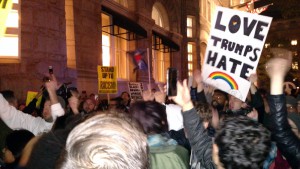Creating Change Beyond Marches

Last week I attended Creating Change, an annual conference spearheaded by the National LGBTQ Taskforce that provides training in grassroots organizing that centers the experiences and expertise of LGBTQ activists.
This five-day event was unlike anything I have ever encountered before. I’ve attended numerous conferences over the years (virtually all atheist, secular, and humanist-centered), but Creating Change was a unique departure that offered approximately 250 workshops and caucus sessions focusing on building leadership skills, professional development needs, political engagement, and mobilizing community-based activism.
Rajani Gudlavalleti, a queer humanist who is an anti-oppression consultant with Baltimore Racial Justice Action and a board member of the Foundation Beyond Belief, also attended Creating Change. When I asked her about why she felt this conference was significant, she said, “Creating Change prioritizes not only advancing our collective knowledge and impact, but works to highlight the need for an intersectional framework to understand the immeasurable diversity–and inequities—within our communities.”
On Saturday a significant number of Creating Change attendees joined the Women’s March on Philadelphia to protest Trump and his incendiary rhetoric that maligns women and femmes, immigrants, Muslims, people of color, and LGBTQ communities. Whether or not the march was actually “inclusive” and truly supportive of all those it claimed to represent is another discussion altogether, but what is clear is that there is a groundswell of resistance to Trump and the cultural prejudices he exacerbates.
To be sure, Trump alone isn’t “what’s wrong with America.” He’s merely an obnoxious, orange symptom that draws attention to social ills that have long festered within this nation. And because he’s so explicit, so crude, and so braggadocious, many can no longer ignore the oppressive beliefs that have allowed the most compromised and unqualified presidential candidate ever to barrel into the Oval Office.
What do we do now that the march is only a memory? After what was a momentous yet singular demonstration, what comes next? If we’re to overcome oppressive systems, it will take more than a single action. We must organize.
Protest is but one tool to inspire change. Marching isn’t an objective—it’s one of many ways to express an objective. Social change is brought about by supporting or toiling in the trenches of grassroots efforts in an ongoing fight that Angela Davis describes as a constant struggle.
In Building a Movement to End the New Jim Crow, An Organizing Guide, Daniel Hunter says it’s a myth that movements succeed if they mobilize large, mass actions:
Countless times the refrain is made: “We just need to have a giant March on Washington.” However, movements don’t win because of singular actions. Movements need ongoing resistance—otherwise, the powerholders can just wait until the march is over and continue ignoring movement requests. Movements require sustained pressure for change at many levels. It takes time to build, but without ongoing resistance, movements don’t achieve their goals.
The Creating Change environment was a continuous reminder that sustainable change takes solidarity (support for the empowerment and liberation of others) and inclusion (integrating the perspective/struggle of others into the common agenda). It takes commitment, not to a single moment like a march, but to a stream of moments that includes self-education and educating others, fundraising, publishing and circulating literature, community-focused collective actions, and donating to organizations devoted to creating the change you want to see in the world.
Social change takes all of us. Humanists believe a meaningful, ethical life is possible through human-derived reason, compassion, and social responsibility. Our commitment to critical inquiry and social concern includes confronting injustice that targets marginalized communities.
We have to be more than our words or strong beliefs. If this first week of Trump’s presidency is any indication, we are all in for an excruciating and perilous four years. This is why the American Humanist Association is partnering with the National Abortion and Reproductive Rights Action League (NARAL), Showing Up For Racial Justice (SURJ), Trans United Fund (TUF), and the National LGBTQ Taskforce to oppose ignorance, bigotry, and legislation that jeopardizes reproductive rights, exacerbates racial disparities, and disregards LGBTQ communities.
Join the AHA as we build towards a more inclusive, socially active humanism. To participate in our volunteer opportunities with NARAL, the National LGBTQ Taskforce, SURJ, and TUF, email me or visit our Feminist Humanist Alliance, LGBTQ Humanist Alliance, or Black Humanist Alliance to fill out a “Join Us” form.
